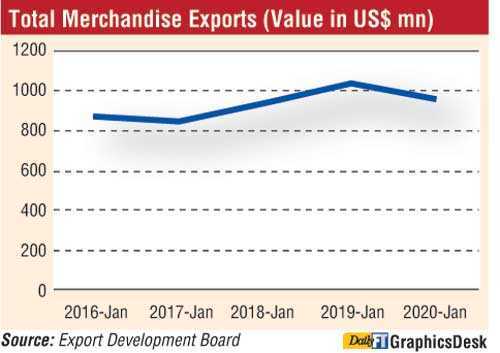Tuesday Feb 17, 2026
Tuesday Feb 17, 2026
Wednesday, 4 March 2020 00:06 - - {{hitsCtrl.values.hits}}
- EDB-forecasted higher services exports help total exports in January up by 1%
- Private sector fears more challenges to exports following coronavirus global pandemic, local issues
The merchandise exports sector has begun 2020 on a negative note, with January’s performance down 7.4%, prompting the private sector to fear more challenges, given the impact of the coronavirus global pandemic, and local incentives and policies awaiting the conclusion of General Elections to become law.
The Export Development Board revealed yesterday that merchandise exports declined by 7.4% to $ 961 million and services exports are estimated to have risen by 26% $ 437.5 million as per provisional data. Total exports including services managed to grow by 0.96% to $ 1.39 billion from a year earlier. The biggest exports, apparel, were down by 0.5% to $ 472 million, whilst tea declined by 10% to $ 997 million and rubber-based exports by near 13% to $ 73 million.
“The overall export turnover increase in January 2020 is indeed a positive note.
However the significant drop in merchandise exports along with a significant drop in rubber and tea, our key export items, is a serious concern,” EDB Chairman Prabhash Subasinghe said.
“The global slowdown in the material handling and construction tire business is the reason for drop in rubber exports; the situation will get aggravated with the virus in Europe and US,” Subasinghe told the Daily FT.
EDB clarified that the figure for service exports has not yet been released, and the EDB has projected figures based on past published records. It was revealed that in the year 2019, the exports recorded over one billion in comparison to the figures of the last five years.
The exports earnings sectors that recorded a positive growth are from coconut and coconut based products ($ 49 million), diamond gems and jewellery ($ 28 million), fruits ($ 4 million), industrial and surgical gloves ($ 20 million), areca nuts ($ 5 million), and betel leaves ($ 2 million).
The most important sectors, apparel ($ 472 million), tea ($ 100 million), rubber-based products ($ 73 million) mainly consisting of rubber tires and tubes ($ 41 million), gaskets, washers, and seals ($ 7 million), electrical and electronic products ($ 28 million), spices and essential oils ($ 20 million), and food and beverages ($ 27 million) reported reduced earnings.
The top markets for tea exports in January were Russia ($ 12 million), Turkey ($ 12 million), Iran ($ 7 million), Iraq ($ 9 million) and Saudi Arabia ($ 5 million).
Exports of cinnamon ($ 13 million), pepper ($ 2 million), cloves ($ 1 million), and essential oils ($ 1 million) recorded reduced figures, whilst nutmeg and mace remained at the level exported in the last year during this period too. Cinnamon moved to Mexico, USA, Columbia, Peru and India in higher quantities, while pepper, cloves and essential oils moved to India.
The main export destinations in January were the United States of America ($ 268 million) followed by the United Kingdom ($ 85 million), India ($ 63 million), Germany ($ 52 million), Italy ($ 46 million), Belgium ($ 30 million) and Netherlands ($ 23 million). It is notable to record that out of the top 10 export destinations, only three markets, namely Italy, China, and Bangladesh, recorded a year on year growth, whilst the other markets are not performing well. Over 53% of the merchandise exports have moved to the top five markets, namely US, UK, India, Italy, and Germany, whilst only 47% of goods have moved to the rest of the markets globally.
The main exports to USA were apparel ($ 193 million) – a drop of $ 10 million, pneumatic rubber tires and tubes ($ 14 million) and gaskets, washers, and seals of hard rubber ($ 2 million). The exports to the United Kingdom during the month of January included apparel ($ 63 million) and small quantities of products namely, footwear, frozen fish, coco-peat/fibre.
For India, export products included areca nuts ($ 5 million), petroleum oil ($ 9 million), animal feed ($ 7 million) apparel and textile articles ($ 8 million) and minor quantities of pepper, processed food, and insulated wires.
It was also noted that the industrial products, namely apparel ($ 27 million), tires and tubes ($ 5 million) gaskets, washers, seals under HS 40169390 of hard rubber ($ 1 million), and tea ($ 6 million) moved to Germany in considerable quantities.